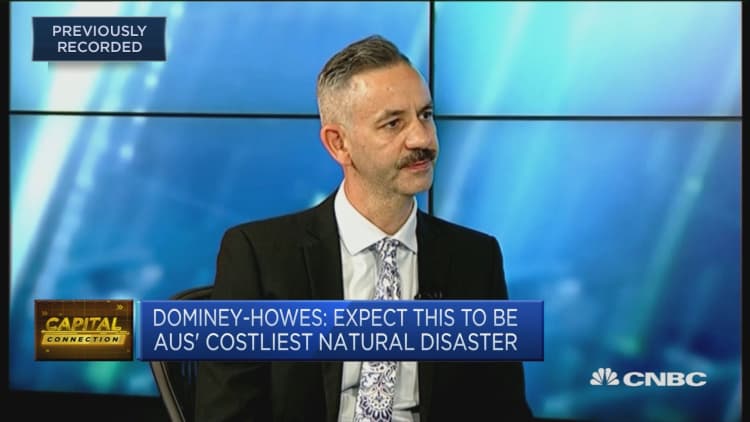Raging bushfires across Australia are threatening to drag down the economy as the country's tourism and consumer sectors take a hit, said the chief economist of BetaShares Capital.
At least 24 people across the country have died from the wild fires, according to official numbers, and the disaster has so far killed half a billion animals and thousands have evacuated from their homes.
David Bassanese, chief economist at BetaShares Capital warned Monday that beyond the devastating loss of lives and property, Australians should also brace for a slowdown in its economy.
"Certainly, from a broader economic perspective, it's not helpful," said Bassanese. "So possibly, from a macro perspective, it could have a negative impact on consumer confidence, which at the moment is very vulnerable — it's been the big drag on economic growth."
As of Sunday, tens of thousands of homes in both New South Wales and Victoria states were without power, Reuters reported.
Despite large-scale military and police effort in providing supplies and evacuating coastal towns, two people remain to be missing, according to Reuters.
These fires are a lot bigger, a lot earlier in the season than we've ever seen before … and I think this is hitting high when we're talking about climate change, I think this is the wake-up call in Australia.David Bassanesechief economist at BetaShares Capital
It's important that the Australian government can make efforts in implementing global climate change policies in place, Bassanese said, urging Canberra to be at the forefront of combating climate change.
"In reality, Australia is going to be one of those countries" that would be most negatively affected by climate change, he said.
Australia has been battling wildfires across much of its east coast for months, and experts have pointed out that climate change is a key factor to the three-year long drought that has left the country's bushland tinder-dry and susceptible to fires.

Australian Prime Minister Scott Morrison and his conservative government have faced much criticism for not doing enough to address the climate issues domestically and internationally. On Monday, the prime minister announced that his government will be committing $2 billion Australian dollars over two years to bushfire recovery, Reuters reported.
"These fires are a lot bigger, a lot earlier in the season than we've ever seen before … and I think this is hitting high when we're talking about climate change, I think this is the wake-up call in Australia. Climate change is starting to affect us and more and more people (are realizing) these are the first tangible signs that's hitting us right square in the face," said Bassanese.
More RBA cuts?
"I think (the Reserve Bank of Australia) should do more," Bassanese said, adding that he sees two more rate cuts by the central bank in the first half of 2020.
"Even before the fires, I thought they would cut another two times given the weakness of the economy," the economist said. "A cut in February is still very, very likely and then a cut within the next few months. Beyond that, what they've said is that they probably don't want to go beyond 0.25% which is very close to zero."
"Then we will have talks of quantitative easing measures, buying government bonds to lower longer term interest rates, I think will be discussed in the second half of year," he said.
At the end of 2019, RBA was already at record low policy rates, which means there won't be too many more rate cuts to come, said the economist.
"It can really only cut rates twice more before it hits what it considers ... a lower bound in terms of short-term interest rates," said Bassanese.


